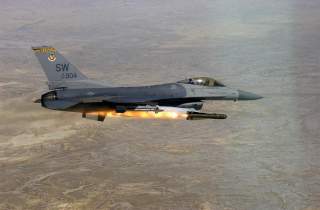Would America Really Go to War with China to Save Taiwan?
Washington must convince Beijing that it is willing to fight a nuclear war over Taiwan if it is to deter China from starting a conventional one--a tall task.
Deterrence is a beguiling concept. It offers the hope that we can prevail over our opponents without actually fighting them because our mere possession of military power will be sufficient to compel them to our will.
This seductive idea seems to be the basis of Michael Cole's view that deterrence will allow America and its allies to defend Taiwan from China without incurring the costs and risks of conflict, and that they should therefore commit themselves to doing so. This view is set out in Michael's most recent contribution to an exchange between us about this issue, and I'd like to thank him for his thoughtful part in our exchange on this sensitive topic.
Alas, I think this view of deterrence is mistaken. Deterrence can work, of course, but only where the deterred power believes that the deterring power is willing to incur the costs and risks of conflict. So Washington can only deter Beijing from using force against Taiwan if Beijing is reasonably sure that Washington is willing to actually fight to do so.
(Recommended: 5 Chinese Weapons of War America Should Fear)
Moreover, because the stakes are so high and the nuclear threshold is so unclear, Washington must convince Beijing that it is willing to fight a nuclear war over Taiwan if it is to deter China from starting a conventional one. Simply possessing armed forces, including nuclear forces, is not enough to do this. You also have to convince the other side that you are willing to use them, and are willing to incur the costs and risks of the resulting conflict.
There is, as Michael acknowledges, a parallel here with the Ukraine. Many in the West believed Russia could be deterred from any military intervention in the Ukraine. But deterrence did not work because Moscow did not believe that Washington cared enough about Ukraine to accept the costs and risks of a military conflict with Russia.
Some might hope that China can be convinced that the U.S. is willing to fight, even if it isn't. This is called bluffing, and it's a dangerous and unreliable tactic. And this is precisely why America cannot reliably deter China from attacking Taiwan. As Michael himself acknowledges, there are real doubts that America would be willing to go to war with China. It seems likely that those doubts are shared in Beijing, and they cannot be dispelled simply by rhetorical reaffirmations of the Taiwan Relations Act, because they arise from a quite reasonable assessment of the balance between costs to America of reunification on the one hand, and the costs of war with China on the other.
(Recommended: 4 Chinese Weapons of War Taiwan Should Fear)
This assessment does not minimize the costs of unification, both to America and to the Taiwanese themselves. It simply sets them realistically against the costs and risks of war with China, which Michael seems to agree are exceptionally grave. And if Americans are not convinced of U.S. resolve, why should we expect China's leaders to be? And if they are not reasonably sure that the U.S. would be willing to actually commit its formidable forces to fight for Taiwan, how can they deter China from attacking it?
(Recommended: 5 Taiwanese Weapons of War China Should Fear)
The conclusion seems clear: America cannot defend Taiwan unless it is really willing to fight China to do so, and unless it is plainly willing to do that, Washington should not mislead the Taiwanese into thinking that they can rely on American support if the worst happens.
This post first appeared in the Lowy Interpreter here.

